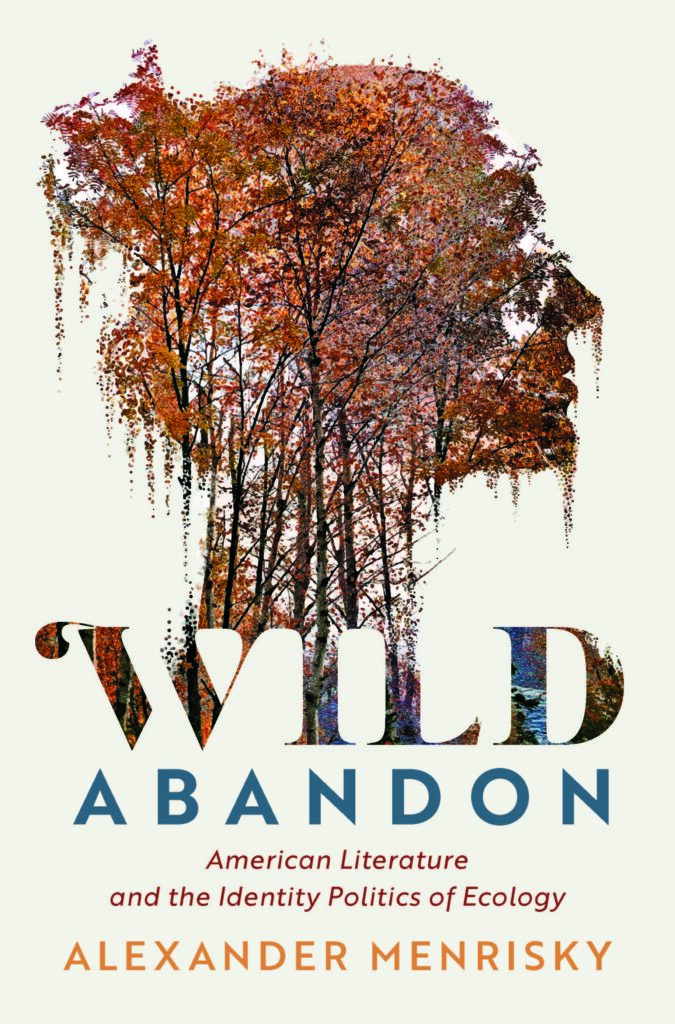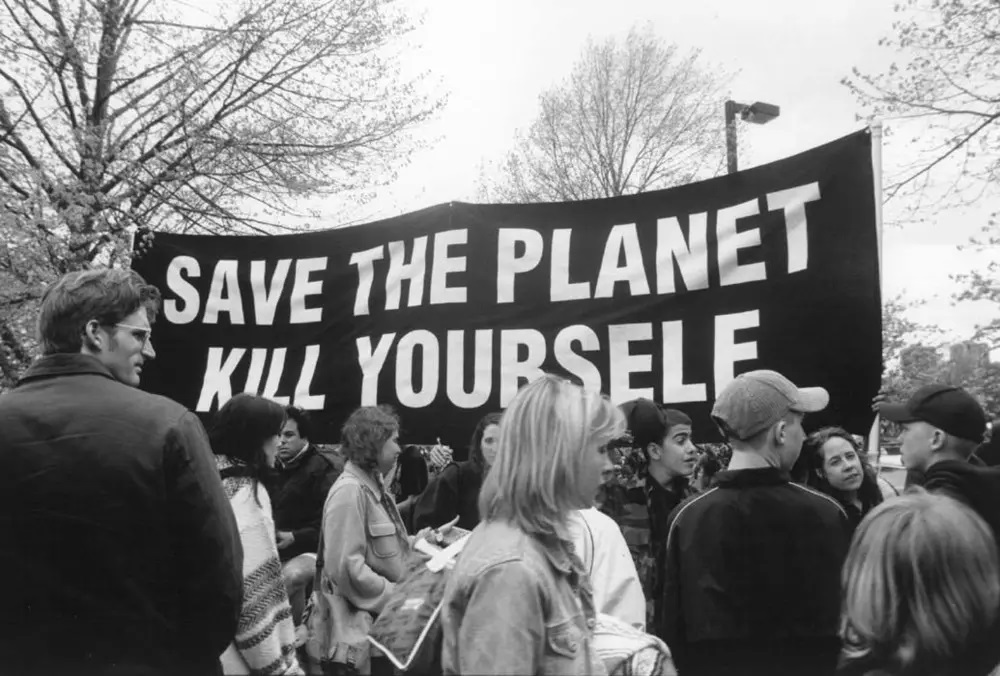By Alexander Menrisky
I’ve only ever taught one book whose title one hundred percent of my students already recognized, regardless of sociocultural background. The book was Jon Krakauer’s Into the Wild, which traces the travels and eventual death of Christopher McCandless in an abandoned bus south of Denali in Alaska. The National Guard in fact airlifted the bus out of the backcountry this past June, given the number of subsequent deaths that resulted from McCandless’s many admirers’ attempts to reach it. Among these, many have sought to emulate specifically what they take to be the man’s authenticity, his conviction that stripping away the social definitions of his identity might enable him to access a truer self: one that exists in unmediated relationship to his nonhuman environment. Despite ongoing (and merited) eye-rolling about the man’s continued relevance, his widespread recognition illustrates how closely intertwined the concepts of identity and environment remain in the popular as well as critical environmental imagination. It also compels us to question how and why narratives told about this relationship continue to pit environment and social life against one another.
Many of the questions that most vibrantly animate the environmental humanities implicitly ask us to reconsider familiar identity categories, from the narrow (the self) to the capacious (race, nation, gender, etc.). For example, how can an individual begin to articulate the universally threatening specter of global climate crisis from their own limited, situated perspective, especially since ecological harm asymmetrically impacts some communities more than others? Such questions amplify the close relationships between socially mediated identities and the environments people live with, as the work of environmental justice continues to illustrate. Still, the field has left largely unexamined the implications of the fact that modern American environmentalism emerged in the 1960s at the same political moment as more explicitly identity-based movements (like Women’s Liberation or Black Power). To what extent did that period’s debates about identity (personal as well as collective) influence environmental art and politics? Could the effects of this sort of interaction be felt now across the environmental humanities, whose scholarly and activist roots dig back to that very moment? What might a cross-pollination between politics of identity and environment have passed down to us? Specifically, what vocabularies have we inherited for thinking identity and environment together? What meanings (intentional or otherwise) do they engender? Does this inheritance help or hinder our contemporary goals?
 I explore precisely these questions in Wild Abandon: American Literature and the Identity Politics of Ecology. The book begins in the 1960s, when environmentalists affiliated with the American New Left struggled to reconcile the newly mainstream science of ecology—and its description of complex, interdependent networks—with the New Left’s politics of authenticity, which placed the unique expression and singular fulfillment of self-identity at the forefront of its program. Highly influenced by psychoanalysis, these environmentalists increasingly understood ecological health (and human relationships to it) in terms of repression. In the decades that followed, they and others increasingly borrowed rhetorical strategies from social movements organized along lines of race, ethnicity, and gender to articulate this dynamic. Just as social oppression represses the authentic group or self-expression of a variety of peoples, it also represses a far more universal kind of authenticity: our ecological interconnection. In other words, these figures mobilized a rhetoric of authenticity to frame ecology as a universal identity position. Since then, countless environmental writers (like McCandless) have mobilized a shared motif—self-dissolution—to express that ostensibly natural (yet repressed) identification with the network writ large, in the process downplaying or erasing the lived realities of socially mediated identity positions as merely “artificial” by comparison.
I explore precisely these questions in Wild Abandon: American Literature and the Identity Politics of Ecology. The book begins in the 1960s, when environmentalists affiliated with the American New Left struggled to reconcile the newly mainstream science of ecology—and its description of complex, interdependent networks—with the New Left’s politics of authenticity, which placed the unique expression and singular fulfillment of self-identity at the forefront of its program. Highly influenced by psychoanalysis, these environmentalists increasingly understood ecological health (and human relationships to it) in terms of repression. In the decades that followed, they and others increasingly borrowed rhetorical strategies from social movements organized along lines of race, ethnicity, and gender to articulate this dynamic. Just as social oppression represses the authentic group or self-expression of a variety of peoples, it also represses a far more universal kind of authenticity: our ecological interconnection. In other words, these figures mobilized a rhetoric of authenticity to frame ecology as a universal identity position. Since then, countless environmental writers (like McCandless) have mobilized a shared motif—self-dissolution—to express that ostensibly natural (yet repressed) identification with the network writ large, in the process downplaying or erasing the lived realities of socially mediated identity positions as merely “artificial” by comparison.
Why is it useful to view this position—more of a rhetorical tendency than a coherent movement—as an environmentalist identity politics? For starters, doing so helps us to situate its emergence in historical context, as an environmentalist engagement with ideas that motivated concurrent identity movements. It also enables us to conceive of this pattern as one among many environmentalist genres (like bioregionalism or environmental justice), with its own set of recognizable conventions that we might more readily identify and therefore critique. Finally, doing so forces us to consider how such tendencies have shaped representations of identity and environment over time, and therefore invites us to reckon with their effects. Given that the tradition I describe aims to erase “artificial” sociocultural distinctions in favor of an “authentic” universal vision, one of the most significant of these effects is a sort of environmentalist gaslighting of women and people of color, especially.
For example, throughout the 1970s and 1980s, the rise in popularity of New Age spirituality also fostered an interest in connections between environmentalism and the use of organic hallucinogens like peyote and ayahuasca. Self-styled gurus argued that the “consciousness expansion” offered by such substances not only signaled the breakdown of the ego, but also, as a result, a rediscovery of a more authentic identification with the ecosystem writ large—one that social forms, from race and gender to selfhood itself, repressed. These gurus often pointed to Indigenous traditions to back up their claims, suggesting that Native peoples by default exemplify such unrepressed, unmediated identification with environment. Though celebratory, this interpretation of Indigenous American experience perpetuated settler-colonial narratives that “uncivilized” Native peoples somehow exist outside social forms, including cultural traditions of their own as well as the devastating effects of settler colonialism itself. Celebrating freedom from repression in the abstract served as an excuse to ignore the concrete social realities of Native life in the United States, including lived conditions of environmental racism.
The idea that social forms repress authentic environmental subjectivity is not unique to this context. Calls to dissolve the ego circulate in numerous sectors of environmental thought, from social and deep ecology to contemporary posthumanism and queer ecology. My impression is that as long as such references survive, so too do the sort of appeals to “authentic” identity that flatten stakeholders into a single ecological whole, ignoring the asymmetrical harms faced (and solutions offered) by marginalized peoples.

Vice Media, from the Church of Euthanasia, 23 October 2015.
For this reason, Wild Abandon ends by asking readers how we can revise the vocabularies we’ve inherited in order to help us strike a balance between universal ecological conditions and particular environmental experiences. As is often the case, conversation with my students has enriched my perspective more than my reading has. As a queer environmentalist, I prioritize critical discussion around inherited ideas about “nature” in all my courses. At the same time, my students and I remain cognizant of our own environment: an institution that chiefly serves first-generation students, just down the road from a superfund site in New Bedford, Massachusetts. As such, we also have cause to address what Colleen Lye, in a recent article in South Atlantic Quarterly, calls “the insufficiency of antiessentialism.” It’s not enough to simply decouple identities from outdated ideas about what qualifies as “natural,” precisely because correlations among race, indigeneity, gender, class, and environment nonetheless do exist, in the form of variable exposure to ecological harm.
I am reminded of a specific time in class when my students and I considered a proposed Indigenous Wildfire Task Force in California. We focused on how we could talk about Native folks’ particular investments in universal climate crisis in a way that captured distinctive relationships between identity and environment without conflating people with land (as settler-colonial writing has long done, as a prelude to the exploitation of both). What words could we literally use to respect those relationships and advocate for preservation without prescribing the “nature” or “authenticity” of either people or land? In other words, how could we revise our vocabularies so our understandings of particular identities and universal environmental challenges neither proceeded separately nor collapsed into each other?
What we settled on was an idiom of ecological consistency rather than authenticity. What we were looking for is what I describe in Wild Abandon as a “vocabulary . . . that accounts for difference and network but still leaves room for a solidity that makes self-identity and political organization possible.” That middle place is what my students and I hoped to capture with the word consistency. The Native writers we read were not intrinsically tied to their environments, but they consistently suffered its despoliation. Similarly, we might argue for climate justice and preservation not because we believe in some “authentic” nature, but because we recognize that consistency in certain environmental conditions is necessary to our collective survival.
Identity and environment exist in close relationship in what we read, write, teach, advocate for, and live. My goal in Wild Abandon is to show how environmentalism writ large has historically navigated that relationship and how it still does. In our own work as environmental humanists, we are at our best when we do so self-reflexively, alongside an ongoing effort to question the vocabularies we’ve inherited and arrive at new ones in turn.
 Alexander Menrisky is a Lecturer in the Department of English & Communication and the Honors College at the University of Massachusetts Dartmouth. He is the author of Wild Abandon: American Literature and the Identity Politics of Ecology (Cambridge University Press, 2020). His work has appeared or is forthcoming in Criticism: A Quarterly for Literature and the Arts, ISLE: Interdisciplinary Studies in Literature and Environment, Mosaic, Resilience, Edge Effects magazine, and elsewhere. At UMass, he is a Service-Learning Faculty Fellow and co-director of the Honors College Research Roundtable series, which connects undergraduates with interdisciplinary faculty research early in their careers. He also curates ASLE’s Teaching Resources Database.
Alexander Menrisky is a Lecturer in the Department of English & Communication and the Honors College at the University of Massachusetts Dartmouth. He is the author of Wild Abandon: American Literature and the Identity Politics of Ecology (Cambridge University Press, 2020). His work has appeared or is forthcoming in Criticism: A Quarterly for Literature and the Arts, ISLE: Interdisciplinary Studies in Literature and Environment, Mosaic, Resilience, Edge Effects magazine, and elsewhere. At UMass, he is a Service-Learning Faculty Fellow and co-director of the Honors College Research Roundtable series, which connects undergraduates with interdisciplinary faculty research early in their careers. He also curates ASLE’s Teaching Resources Database.
